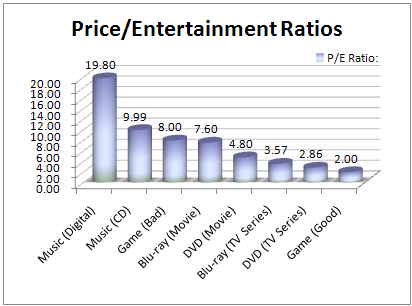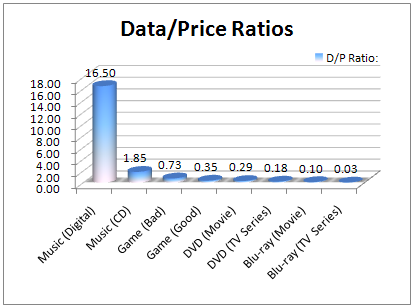Movies, TV, Music & Gaming: Which is the best value?
I’m currently running a poll to see whether people spend more money on video gaming or movies. So far, the responses suggest that an equal number of people spend more on video gaming to people who spend more on movies, and the rest spend roughly the same.
This got me thinking: What is actually the best value in terms of entertainment gained from the money spent? The music industry has been crying about lost income and all that, but is music still the best value in terms of entertainment, or have people moved on to better (and cheaper) things?
A really non scientific approach to solving this problem would to be take typical prices for the following types of activities, and then estimate roughly the amount of hours each type of entertainment provides, and then work out the P/E ratio. It’s not the Price/Earnings ratio that’s way way too high on the S&P 500 at the moment, P/E in this case stands for Price/Entertainment, which is roughly how much it costs per hour of entertainment. Then to divide the activies more thoroughly, I separate movie DVDs to DVDs of TV series (which I believe should offer better bang for bucks), the same for Blu-ray, and then gaming is separated into good games (like Fallout 3, GTA IV) and the bad ones (Turning Point: Fall of Liberty). And finally, add in music for both iTunes/Amazon download and traditional CD purchases. These are the activities:
- DVD (movies)
- DVD (TV series)
- Blu-ray (movies)
- Blu-ray (TV series)
- Gaming (bad game)
- Gaming (good game)
- Music (downloads)
- Music (CDs)
So let’s get straight to the results, and here they are in graph form (the lower the P/E, the better the value):

The Price/Entertainment Ratio Of Movies, TV, Music and Gaming
I don’t think the results are all that of a surprise, with perhaps the only real surprise being how poor value music is compared to the other types of entertainment.
A good game, such as Fallout 3, World of Warcraft, GTA IV, will give you hours of enjoyment. Even if you don’t include multiplayer games, which has almost infinite re-playability, single player games and game campaigns still offer hours upon hours of enjoyment (GTA IV easily offers 30+ hours, especially if you do all the side missions – the same with Fallout 3). So a good game is the best value in terms of entertainment, even if games are quite a bit more expensive than your average DVD.
DVDs of TV series are the second best value in terms of entertainment, roughly equal to gaming. Now this figure can vary a lot, since some TV shows are in the 30 minute format, while others are in the hour format. And some shows have long series (20+ episodes), while others are short (10 episode). And the pricing varies too. But taking typical TV series of say 20+ one hour (42 minute) episodes plus extra features at a common price of say $40 on Amazon, then it will still represent very good value in terms of entertainment.
Blu-ray TV series is next, showing that Blu-ray prices have dropped recently to make it actually better value in many cases than movies on DVD, which is the 4th best value source of entertainment. It kind of make sense when you think about it because for $50, you can get maybe 15 hours of TV shows on Blu-ray, while for a fifth of that, you only get about 2 hours worth of movies on DVD. And with movies on Blu-ray a bit more expensive than the DVD version normally, it falls slightly behind movies on DVD in terms of value.
Now we get to the interesting bits. Bad games, such as those with incredibly short single player campaigns (sometimes as short as 3 to 5 hours, for a quick play through), and no multiplayer. And then there are games that are just so bad, you don’t even want to finish them. These games are quite bad in value, and perhaps explains why gaming piracy is high as bad games outnumber good games by quite an impressive margin.
And speaking of piracy, we now move onto the last and the most expensive form of the listed types of entertainment: music. Music CDs are better value than downloads at the moment, you can usually source a CD for under $10 on Amazon, and this will give you a maximum of 72 minutes, but most are way short of this at around 40 to 50 minutes. $10 for an hour of entertainment is quite expensive in the grand scheme of things, and with almost no interactivity, it’s no wonder that piracy rates are so high. Then we have downloads, which at around $1 per song, is expensive. However, you can choose only the songs you enjoy by downloading them separately, as opposed to having to buy an CD album just because you want one song, so they may not work out to having twice the P/E ratio of CDs. However, $1 for usually just 3 minutes of entertainment doesn’t scream good value for me.
Of course, none of the above includes re-use. A piece of music you like you might listen to it hundreds of times over just a single year. And you might watch your favourite movies as a monthly event. And who hasn’t gone back to an old game just to play it through again (and the multiplayer, of course). There is also the cost to get started, because listening to music is cheap, while getting into Blu-ray or gaming may be much more expensive. And of course, music might mean more to you and may be more memorable than say a video game, and this effect cannot be tabulated and graphed. But based on a price comparison only for a single play-through, it’s clear that gaming and TV on DVDs are still the best value at the moment.
So what was the point of this blog? Not much, but I guess it just goes to show that instead of crying about piracy, the music industry needs to take a closer took and see if there’s a reason why profits are dropping. Maybe moving to a subscription model, or an unlimited downloads model, may be the only way to get those P/E ratios back down to acceptable levels.
Update:
I thought it would be interesting to calculate the best value in a different way. Instead of using the price to determine value, I can use the size of the digital data versus the price per “bit” of data. This is an even sillier way to calculate value, but data size often corresponds to quality (in terms of video and audio, at least). Here’s the graph:
This type of calculation obviously favours Blu-ray, as HD content can be huge in size compared to their SD cousins, but the different in quality and entertainment does not share the same gulf. But DVDs still represents excellent value, as do good games. Here, bad games are also calculated to have good value, which just goes to prove that the number of DVDs that games occupy has nothing to do with how long the game actually last or how long you actually want to play the game. In the grand scheme of things, music CDs, because it uses no compression, doesn’t do too badly. But once again, digital music is way out there in terms of the relationship between pricing and data size. Which is why all-you-can-eat DRM-free music download services are a must to justify continued consumer spending on music – there are a lot of bad music out there, and the only way you can make people pay for it is if they are so cheap, that it’s worth the trouble. At the very least, making ultra high quality lossless downloads should at least increase the data size, the audio quality, if not exactly the amount of entertainment a song download provides.


August 23rd, 2009 at 6:06 pm
[…] DVDGuy’s Blog @ Digital Digest Just what the world needs, another blog « Movies, TV, Music & Gaming: Which is the best value? […]
August 30th, 2009 at 6:28 pm
[…] And there’s still aren’t any flying cars. Meh. Oh, I did as promised and updated the blog post I wrote two weeks ago about the value of digital entertainment, but this time instead of basing it […]
August 31st, 2009 at 4:29 pm
That Data/Price ratio table is really sick… not representative, fake scientific, and completely misses the point. Even text files with book copies on them can’t be measured like that.
I really like your site, this is the first time when I said “Wha’?”. Keep up the good work 🙂
August 31st, 2009 at 5:25 pm
Junpei: That’s why I said it was “an even sillier way” to calculate the value of something 🙂
September 2nd, 2009 at 3:59 am
I think it´s quite clear that this was only a little statistical experiment. And the author himself aknowledges this. You can´t say that it is “fake scientific” if he didn´t state that it was cientific nor implied it to be.
The whole point is “trying to find other ways to represent entertaiment value statistically”. A general and simple conclusion is expected. I don´t see a problem with his methods/conclusions.